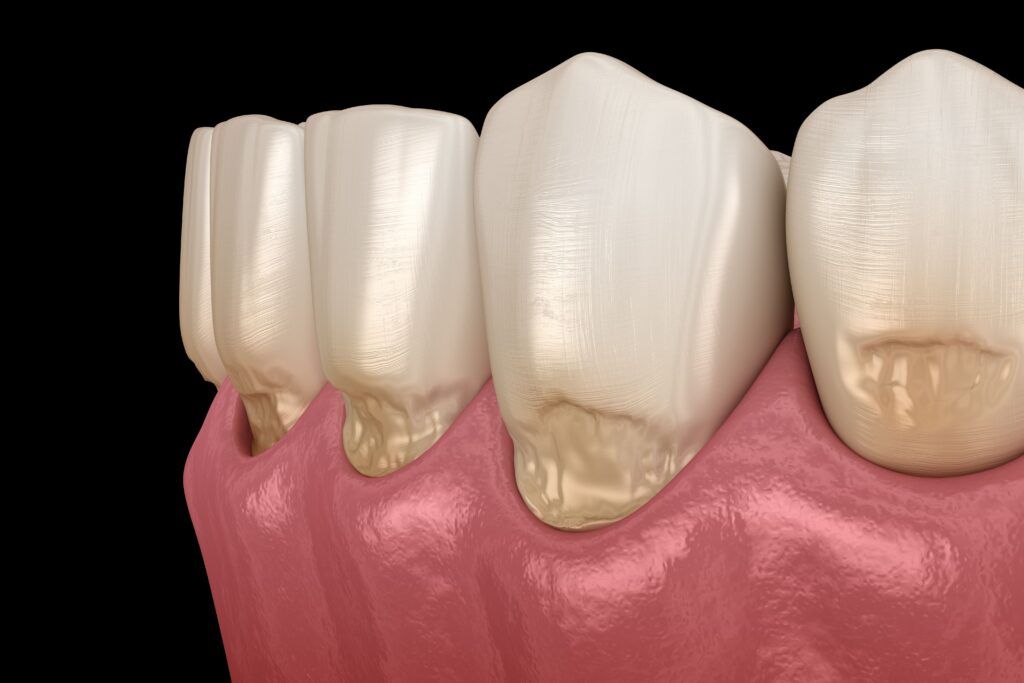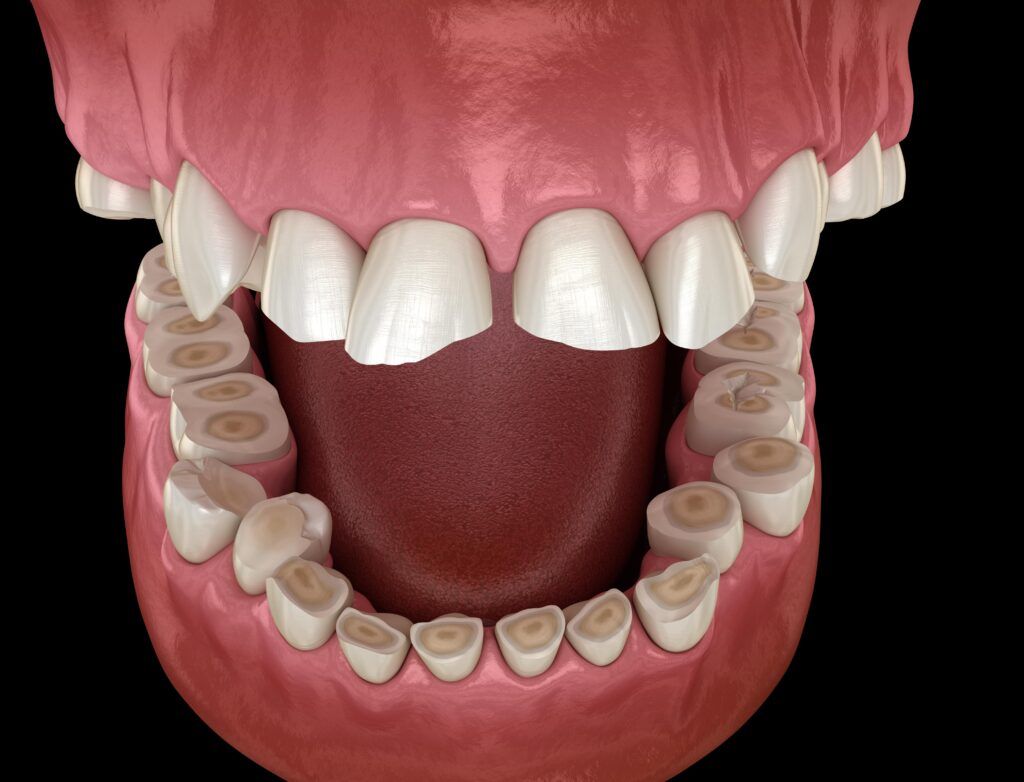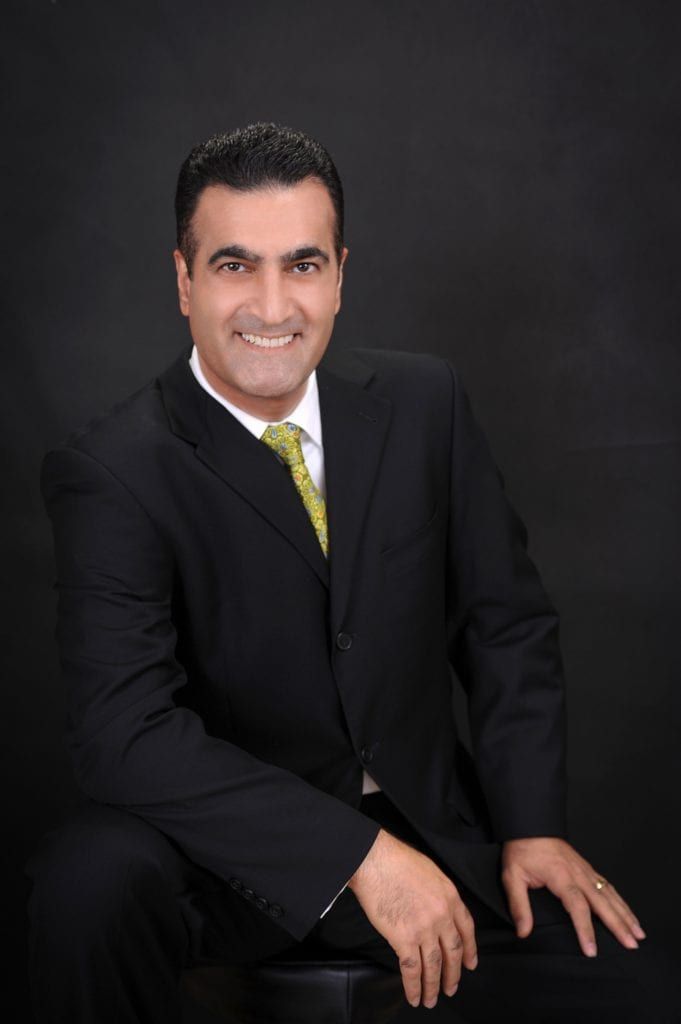Dental health is important at any age, but as we get older, our risk for dental problems increases. Poor dental health can impact our overall health and well-being, making it crucial to take steps to maintain healthy teeth and gums as we age. Unfortunately, many older adults face barriers to accessing dental care, such as lack of insurance or limited availability of geriatric dentists. In this blog post, we will explore the impact of aging on dental health and discuss strategies for preventing and treating dental problems in older adults.
Dental Problems Common with Aging
There are several common dental problems associated with aging, including:

- Gum disease: Also known as periodontitis, gum disease is a bacterial infection that affects the tissues and bones that support the teeth. It can cause inflammation, bleeding, and tooth loss if left untreated.
- Tooth decay and cavities: Tooth decay occurs when bacteria in the mouth produce acids that erode tooth enamel. Over time, this can lead to cavities and tooth loss.
- Dry mouth: As we age, we may produce less saliva, leading to dry mouth. This can contribute to tooth decay and gum disease.
- Tooth loss: Tooth loss can occur due to a variety of reasons, including gum disease, injury, and decay.
- Oral cancer: The risk of oral cancer increases with age. It is important to have regular dental check-ups to detect any signs of oral cancer early on.
- Sensitivity: As we age, our tooth enamel can become thinner, leading to increased sensitivity to hot and cold temperatures.
It is important to address these dental problems early on to prevent them from causing further damage to teeth and gums. Regular dental check-ups and proper oral hygiene practices can help prevent and treat these common dental problems associated with aging.
How Age Contributes to Dental Problems
Aging can cause dental problems in several ways:

- Wear and tear: As we age, our teeth are subjected to years of wear and tear from chewing, grinding, and exposure to acidic foods and drinks. This can lead to enamel erosion, cracks, and chips in the teeth, which can increase the risk of tooth decay and other dental problems.
- Gum recession: Gum recession is a common problem among older adults, and it can be caused by a variety of factors, including age-related changes in the gums, periodontal disease, and aggressive brushing. Gum recession can lead to tooth sensitivity, gum disease, and tooth loss if left untreated.
- Dry mouth: Dry mouth is another common problem among older adults, and it can be caused by medication use, medical conditions, and age-related changes in the salivary glands. Dry mouth can increase the risk of tooth decay and gum disease, as saliva helps to wash away food particles and neutralize acids in the mouth.
- Poor nutrition: Older adults may be more susceptible to poor nutrition due to a variety of factors, such as changes in appetite, difficulty chewing, and medical conditions that impact the ability to eat a balanced diet. Poor nutrition can lead to a range of dental problems, including tooth decay and gum disease.
- Medical conditions: Many medical conditions can impact dental health, including diabetes, heart disease, and cancer. These conditions can increase the risk of gum disease and tooth decay, and they may require special considerations when receiving dental treatment.
Prevention and Treatment of Age-Related Dental Issues
As individuals age, dental problems become more prevalent and can have a significant impact on overall health and well-being. However, there are several proactive steps that older adults can take to prevent and treat dental issues. The first step in preventing dental problems is to practice good oral hygiene habits, including brushing teeth twice a day with fluoride toothpaste, flossing daily, and using an antiseptic mouthwash. Regular dental checkups and cleanings are also important to detect any dental issues early and prevent them from progressing into more serious problems.
Eating a healthy and balanced diet is another important factor in maintaining good dental health. A diet that is rich in fruits, vegetables, whole grains, and lean protein can provide essential nutrients that help keep teeth and gums healthy. It’s also important to limit sugary and acidic foods and drinks, which can contribute to tooth decay and erosion.
Avoiding harmful habits such as smoking and excessive alcohol consumption can also help prevent dental problems. These habits have been linked to an increased risk of gum disease, tooth decay, and oral cancer.
Certain medical conditions, such as diabetes and cancer, can impact dental health. It’s essential to work with dental professionals and medical providers to manage any medical conditions and medications to minimize the impact on oral health.
Prompt treatment of dental problems is crucial to prevent them from worsening. Treatment may include fillings, crowns, root canals, or tooth extraction, depending on the severity of the issue. If tooth loss occurs, dentures or implants may be considered to restore the appearance and function of the teeth.
In Conclusion
In conclusion, aging can have a significant impact on dental health, with various age-related factors contributing to an increased risk of dental problems. Wear and tear, gum recession, dry mouth, poor nutrition, and medical conditions can all affect dental health and lead to a range of issues, including tooth decay, gum disease, and tooth loss. However, by taking proactive steps to prevent dental problems and seeking prompt treatment when issues arise, older adults can maintain good oral health and overall well-being. It’s essential to work with dental professionals and medical providers to manage any medical conditions and medications to minimize the impact on oral health. By staying on top of dental health, older adults can enjoy a healthy, happy smile for years to come.

Dr. Sadati possesses extensive experience in all aspects of advanced restorative dentistry, with an emphasis in cosmetic and implant dentistry. He has attained Accredited Fellow status in the American Academy of Cosmetic Dentistry (AACD), the most rigorous, demanding credentialing process in the world. He is the only AACD Accredited Fellow in South Florida.


